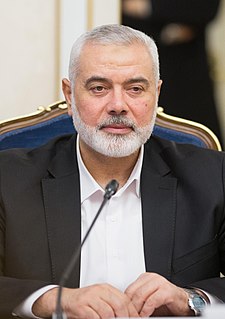A Quote by Ismail Haniyeh
Israel no longer has allies in Egypt and in Tunisia, we are saying to the Zionist enemies that times have changed and that the time of the Arab Spring, the time of the revolution, of dignity and of pride has arrived.
Related Quotes
Some socialist movements in Egypt, Tunisia and Bahrain, for instance, were genuine. I was making films about the so-called Arab Spring, and I'm well aware of how complex the situation really was. But it goes without saying is that the West immediately infiltrated and 'derailed' the revolutions, turning them into what you have described.
You can understand Tunisia revolution as a failure to censor the internet. And Libya had that failure too. It's very difficult for governments that are autocratic and don't have broad popular support to be in power when a lot of people have these devices. That was what Arab Spring was about, that people could express this and lead to revolution.
What is irreversible in the Arab world is this intellectual revolution, the awakening that we can get rid of dictators. That is here, and the people have this sentiment and this political power. They feel that they can do it, and it's still there. At the same time, we don't know what is going to happen. So to be very quick by saying, "Oh, revolutions and Arab Spring," and - you know, what I'm advocating is to take a cautious optimism as the starting point of our analysis and to look at what is happening.
Women in the Arab world have a rich history in their active participation in political change from the Algeria revolution against the French occupation to the most recent revolution in Tunisia, Egypt, Libya among other countries. The question is not their participation. Their question is the incorporation of women's voices fully in the new definitions of the countries where change has happened.
I think no country is going to be immune from the Arab awakening because the Arab awakening is driven by deep human longing for dignity, for justice and for freedom. I think that applies to young people in Saudi Arabia as much as to young people in Egypt, Tunisia, or Yemen, or Libya, or Syria. If I were in Saudi Arabia, I would be getting ahead of this and looking for ways to appreciate those aspirations and align my country with them.

































